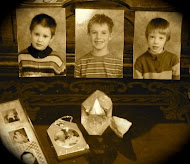Once you go there, you have to commit. And brace yourself. When a child learns that there is something different about my children, you can pretty much guarantee that the questions will be peppered like a machine gun.
- what do they use the iPads for?
- what do you mean they can't talk?
- well how do they tell each other things?
- that means they can't tell each other their secrets! (horrified)
- why does Owen look scared?
- why would he be nervous because I'm looking at him?
- why does he gets scared of people he doesn't know?
- so he can't talk AND he doesn't understand all words?
- well how do they play if they can't talk?
...and so it goes.
I welcome the questions now. Six or seven years ago, I may have hid from them. It is still painful sometimes to talk about the boys' challenges, because I feel disloyal to them somehow. Like I'm betraying them by pointing out their differences, particularly to another child. If the conversation lasts long enough for me to get a word in, I will follow up my Q&A Period with a bragging session. I especially like to note the look of shock when I tell people that Will can read and write, or that Owen, however quiet he may appear - can communicate using proloquo2go and some sign. He's really smart!
However uncomfortable it makes me feel and lord knows, I don't even know what the twins are thinking when they're hearing us have these conversations about them, answering their questions means I am raising awareness and dispelling ignorant assumptions. Hopefully I might be normalizing autism so that that child won't think twice about seeing another child with autism in her class and might even seek him out as a friend.
My openness isn't restricted to kids. Grown-ups -- ask me questions. I'd rather you ask, than assume and not be right. Just be considerate of the fact that these are my kids. And how might you feel if I asked you similar personal questions about your own children? I can usually tell when I meet adults, that they want to ask questions, but are afraid to. So I usually try and initiate the conversation first to break the awkward ice. I can also usually tell which adults are asking out of compassion or seeking understanding, and which are asking for entertainment (for lack of a better word). Sometimes it feels like these people are asking for the answers so that they can complete an exam, as if my kids are science experiment lab rats. We're talking about my children here. Please have some sensitivity or at least some common sense.
I may have posted this on the blog before, but it's worth it. These are a couple of video clips I found that you can show to your kids. They aren't perfect and neither do they represent all kids on the Spectrum.
And as explained by my hero, Temple Grandin:
Ask away!


















No comments:
Post a Comment